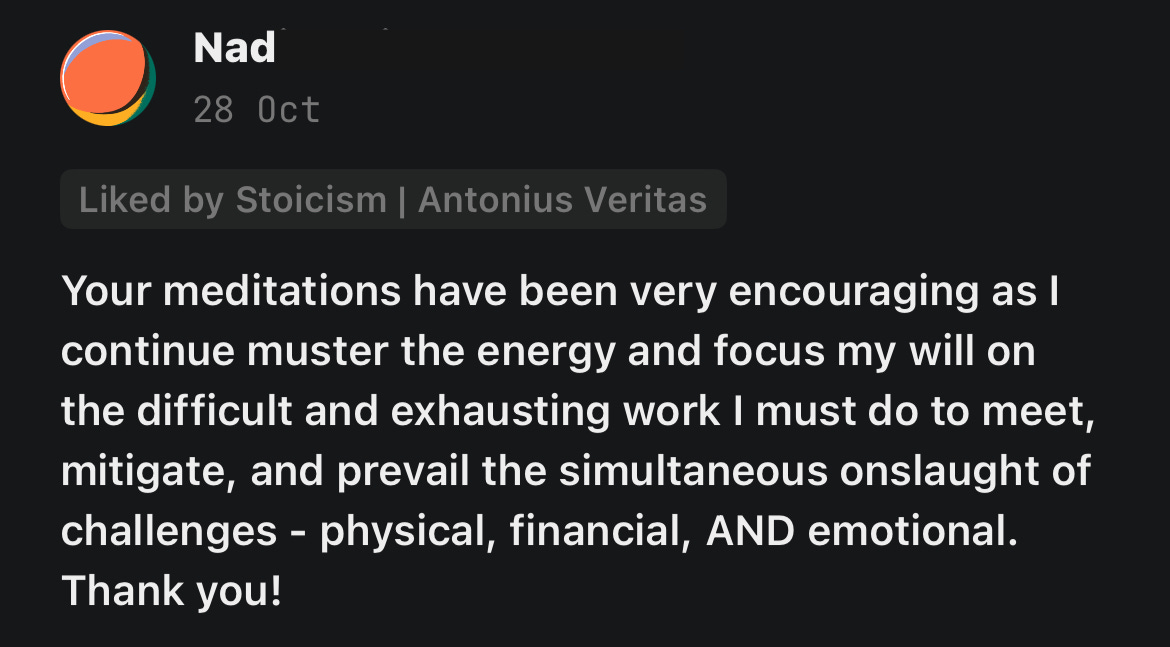LII. On the Thoughts and Feelings We'd Rather Avoid
Even feelings of insignificance or being overlooked hold within them a simple truth: we can stop waiting for others to validate us and instead validate ourselves through action and integrity.
The ‘Neuroscience-based Tools’ section is a companion for The Stoic Manual to help you become wealthier, happier & more powerful by boosting your resilience, drive, mood, motivation, relationships, focus, and overall health—by Dr. Antonius Veritas.
P.S: Scroll to the end for a practical guide on how to face and handle the thoughts and feelings you’d rather avoid. For what helps us most is having a way forward.
“As Cicero says, we hate gladiators if they are quick to save their lives by any means; we favor them if they show contempt for their lives.” —Seneca
This fable is known as The Oak and the Reed. It goes like this:
An oak tree and a reed were having a debate.
The oak boasted of its strength, saying,
“I am mighty and immovable. I stand tall against the wind, while you bend and bow to it. Surely, I am superior to you.”
The reed replied,
“You may be strong, but you do not yield. When the storm comes, your rigidity will be your downfall.
I, on the other hand, may bend, but I will not break.”
Soon after, a violent storm swept through.
The oak stood firm against the gale, but its unyielding stance caused it to snap and fall.
Meanwhile, the reed, bending and swaying with the wind, emerged unharmed.
Life unfolds in ways that can unsettle and humble us, forcing us to grapple with our fragility.
We find ourselves in moments of financial strain—pretending dessert is a concept best left to philosophers, staring down the loss of loved ones, or wrestling with feelings of inadequacy and rejection.
However, these aren’t malicious aberrations
They are part of the architecture of existence.
The question isn’t whether we’ll encounter hardship but if we’ll use it to sharpen ourselves.
Or let it dull our will and wits.
The benefit of facing the uncomfortable truths we fear, our weaknesses and insecurities, is that we get to know what to do and that's enough power to help us push through.
Because like a god, we're our best friend and savior.
For instance, the realization that the world is indifferent to our desires can feel deflating—until we grasp that it also liberates us.
If life doesn’t cater to our whims, then we are free to build it on our terms.
To do whatever we want.
There’s power in understanding that no one owes us success or love, but the means to earn these things—good character and wisdom—are in us, waiting for us to use them.
We can't outsource the weighty business of loving ourselves to anyone.
It would be nice if we got credit, consistent and unconditional love, applause, and accolades all the time.
But it's rare, close to impossible, and we can't afford to feel unworthy in the meantime.
Let that fact purify our ambitions, our character, generate eternal self-love—wash out the pusful stains of seeking approval, instead of sinking into cynicism.
Hardship, then, becomes a kind of companion.
Granted, it’s not the charming conversationalist we might prefer, but it’s the type that points out the spinach in our teeth when no one else dares.
Financial struggles have a way of distilling our focus.
They teach us what is essential.
What is frivolous.
And what can be done without entirely.
Weaknesses—those vexing little reminders that we’re not quite as clever or capable as we hoped—are simply invitations to grow stronger.
If nothing else, adversity at least keeps life entertaining—if you enjoy the sort of humor where the punchline is often delayed by months.
Or even years.
And then there’s loss.
To love someone while knowing they could be gone tomorrow is a truth so bittersweet that most of us would rather not think about it.
But when we do, we find that it isn’t despairing—it’s motivating.
If time with someone is finite, it becomes precious.
We learn to treasure the moments we have, to be at our best, to make each conversation meaningful, and to stop postponing the things that truly matter.
Even loneliness, that existential threat to the human condition, can become an ally.
Solitude forces us to confront who we are without the crutch of external validation.
We discover whether we truly enjoy our own company or whether we’ve been filling the silence with distractions.
And if the answer isn’t flattering? Well, that’s an excellent reason to become someone we would admire.
We also get to enjoy the beautiful but neglected parts of the world that would be hidden behind the curtain of company.
We get to rediscover the world as a livelier home.
Our shortcomings—the bad decisions, the misjudged risks, the gaps in our skillsets—are not immutable flaws.
They are problems to be solved.
Financial scarcity isn’t a permanent sentence but a crucible that refines our resourcefulness and focus.
Weaknesses, when confronted honestly, reveal the areas where we can grow stronger.
Even feelings of insignificance or being overlooked hold within them a simple truth.
We can stop waiting for others to validate us and instead validate ourselves through action and integrity.
Hardship isn’t asking us to surrender.
It’s asking us to work.
Frustration shows us where to innovate or it’s a signal that we’re learning.
We do not grow by shrinking from those uncomfortable emotions and thoughts.
We grow by exposing our vulnerabilities with confidence and dignity, leaning into them, understanding their roots, and channeling their energy into something constructive.
Life isn’t designed to spare our feelings, and thank goodness for that.
After all, what’s the alternative?
A life so padded with comforts that we emerge from it as soft and unremarkable as overcooked pasta?
It’s Machiavelli who said it eloquently in The Prince,
I am well persuaded, that it is better to be impetuous than cautious.
For Fortune is a woman who to be kept under must be beaten and roughly handled; and we see that she suffers herself to be more readily mastered by those who so treat her than by those who are more timid in their approaches.
And always, like a woman, she favours the young, because they are less scrupulous and fiercer, and command her with greater audacity."
Now, I’m not telling you to beat up the beautiful and fairer sex—that’s weak.
But the metaphor stands.
The world doesn’t care about what we want—but it is full of opportunities to take what we’re willing to work for.
When we internalize this, we stop resenting the struggle and start embracing it as the price of entry into a meaningful life.
The path forward isn’t about perfection or invulnerability; it’s about persistence.
We don’t need to conquer everything all at once.
We need only to face what’s in front of us, one action at a time.
With high-mindedness, grace, wit, blitzkrieg, ingenuity, and dignity.
Practical Strategies for Facing and Using Hardship
Here’s how to make this Stoic practice actionable and seamlessly integrate it into your daily life for the best results—a life full of power, wealth, success, confidence, and happiness. You deserve it all.
1. Financial Challenges
Living with financial limitations is about cutting costs and building a mindset of resourcefulness, abundance, and long-term planning.
Here’s how to win at the money game:
Do you like this entry so far? ⭐️
Support the publication to read the rest and access 100+ premium essays, neuroscience-based tools & meditations.
Join 7000+ other readers.
What my supporters are saying…






